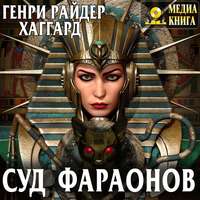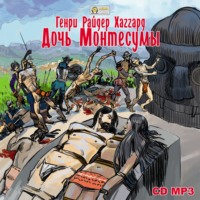 полная версия
полная версияThe World's Desire
“Do ye fear?” he cried. “Cowards, I fear not. It is better to look upon the glory of the Hathor and die than to live and never see her more. Set my face straight, ye priests, set my face straight, at the worst I can but die.”
So they led him as near the curtains as they dared to go and set his face straight. Then with a great cry he rushed on. But he was caught and whirled about like a leaf in a wind, so that he fell. He rose and again rushed on, again to be whirled back. A third time he rose and rushed on, smiting with his blind man’s staff. The blow fell, and stayed in mid-air, and there came a hollow sound as of a smitten shield, and the staff that dealt the blow was shattered. Then there was a noise like the noise of clashing swords, and the man instantly sank down dead, though the Wanderer could see no wound upon him.
“Draw near! Draw near!” cried the priest again. “This one is fallen. Let him who would win the Hathor draw near!”
Then the man who had fled from the host of the Apura rushed forward, crying on the Lion of his tribe. Back he was hurled, and back again, but at the third time once more there came the sound of clashing swords, and he too fell dead.
“Draw near! Draw near!” cried the priest. “Another has fallen! Let him who would win the Hathor draw near!”
And now man after man rushed on, to be first hurled back and then slain of the clashing swords. And at length all were slain save the Wanderer alone.
Then the priest spake:
“Wilt thou indeed rush on to doom, thou glorious man? Thou hast seen the fate of many. Be warned and turn away.”
“Never did I turn from man or ghost,” said the Wanderer, and drawing his short sword he came near, warily covering his head with his broad shield, while the priests stood back to see him die. Now, the Wanderer had marked that none were touched till they stood at the very threshold of the doorway. Therefore he uttered a prayer to Aphrodite and came on slowly till his feet were within a bow’s length of the threshold, and there he stood and listened. Now he could hear the very words of the song that the Hathor sang as she wove at her loom. So dread and sweet it was that for a while he thought no more on the Guardians of the Gate, nor of how he might win the way, nor of aught save the song. For she was singing shrill and clear in his own dear tongue, the tongue of the Achæans:
Paint with threads of gold and scarlet, paint the battles fought for me, All the wars for Argive Helen; storm and sack by land or sea; All the tale of loves and sorrows that have been and are to be. Paint her lips that like a cup have pledged the lips of heroes all, Paint her golden hair unwhitened while the many winters fall, Paint the beauty that is mistress of the wide world and its thrall! Paint the storms of ships and chariots, rain of arrows flying far, Paint the waves of Warfare leaping up at Beauty like a star, Like a star that pale and trembling hangs above the waves of War. Paint the ancient Ilios fallen; paint the flames that scaled the sky, When the foe was in the fortress, when the trumpet and the cry Rang of men in their last onset, men whose hour had dawned to die. Woe for me once loved of all men, me that never yet have known How to love the hearts that loved me. Woe for woe, who hear the moan Of my lovers’ ghosts that perished in their cities overthrown. Is there not, of Gods or mortals, oh, ye Gods, is there not one — One whose heart shall mate with my heart, one to love ere all be done, All the tales of wars that shall be for my love beneath the sun?Now the song died away, and the Wanderer once more bethought him of the Wardens of the Gate and of the battle which he must fight. But as he braced himself to rush on against the unseen foe the music of the singing swelled forth again, and whether he willed it or willed it not, so sweet was its magic that there he must wait till the song was done. And now stronger and more gladly rang the sweet shrill voice, like the voice of one who has made moan through the livelong winter night, and now sees the chariot of the dawn climbing the eastern sky. And thus the Hathor sang:
Ah, within my heart a hunger for the love unfelt, unknown, Stirs at length, and wakes and murmurs as a child that wakes to moan, Left to sleep within some silent house of strangers and alone. So my heart awakes, and waking, moans with hunger and with cold, Cries in pain of dim remembrance for the joy that was of old; For the love that was, that shall be, half forgot and half foretold. Have I dreamed it or remembered? In another world was I, Lived and loved in alien seasons, moved beneath a golden sky, In a golden clime where never came the strife of men that die. But the Gods themselves were jealous, for our bliss was over great, And they brought on us division, and the horror of their Hate, And they set the Snake between us, and the twining coils of Fate. And they said, “Go forth and seek each other’s face, and only find Shadows of that face ye long for, dreams of days left far behind, Love the shadows and be loved with loves that waver as the wind.”Once more the sweet singing died away, but as the Wanderer grasped his sword and fixed the broad shield upon his arm he remembered the dream of Meriamun the Queen, which had been told him by Rei the Priest. For in that dream twain who had sinned were made three, and through many deaths and lives must seek each other’s face. And now it seemed that the burden of the song was the burden of the dream.
Then he thought no more on dreams, or songs, or omens, but only on the deadly foe that stood before him wrapped in darkness, and on Helen, in whose arms he yet should lie, for so the Goddess had sworn to him in sea-girt Ithaca. He spoke no word, he named no God, but sprang forward as a lion springs from his bed of reeds; and, lo! his buckler clashed against shields that barred the way, and invisible arms seized him to hurl him back. But no weakling was the Wanderer, thus to be pushed aside by magic, but the stoutest man left alive in the whole world now that Aias, Telamon’s son, was dead. The priests wondered as they saw how he gave back never a step, for all the might of the Wardens of the Gate, but lifted his short sword and hewed down so terribly that fire leapt from the air where the short sword fell, the good short sword of Euryalus the Phæacian. Then came the clashing of the swords, and from all the golden armour that once the god-like Paris wore, ay, from buckler, helm, and greaves, and breastplate the sparks streamed up as they stream from the anvil of the smith when he smites great blows on swords made white with fire.
Swift as hail fell the blows of the unseen blades upon the golden armour, but he who wore it took no harm, nor was it so much as marked with the dint of the swords. So while the priests wondered at this miracle the viewless Wardens of the Gate smote at the Wanderer, and the Wanderer smote at them again. Then of a sudden he knew this, that they who barred the path were gone, for no more blows fell, and his sword only cut the air.
Then he rushed on and passed behind the veil and stood within the shrine.
But as the curtains swung behind him the singing rose again upon the air, and he might not move, but stood fixed with his eyes gazing where, far up, a loom was set within the shrine. For the sound of the singing came from behind the great web gleaming in the loom, the sound of the song of Helen as she heard the swords clash and the ringing of the harness of those whose knees were loosened in death. It was thus she sang:
Clamour of iron on iron, and shrieking of steel upon steel, Hark how they echo again! Life with the dead is at war, and the mortals are shaken and reel, The living are slain by the slain! Clamour of iron on iron; like music that chimes with a song, So with my life doth it chime, And my footsteps must fall in the dance of Erinnys, a revel of wrong, Till the day of the passing of Time! Ghosts of the dead that have loved me, your love have been vanquished of death, But unvanquished of death is your hate; Say, is there none that may woo me and win me of all that draw breath, Not one but is envied of Fate?Now the song died, and the Wanderer looked up, and before him stood three shadows of mighty men clad in armour. He gazed upon them, and he knew the blazons painted on their shields; he knew them for heroes long dead – Pirithous, Theseus, and Aias.
They looked upon him, and then cried with one voice:
“Hail to thee, Odysseus of Ithaca, son of Laertes!”
“Hail to thee,” cried the Wanderer, “Theseus, Ægeus’ son! Once before didst thou go down into the House of Hades, and alive thou camest forth again. Hast thou crossed yet again the stream of Ocean, and dost thou live in the sunlight? For of old I sought thee and found thee not in the House of Hades?”
The semblance of Theseus answered: “In the House of Hades I abide this day, and in the fields of asphodel. But that thou seest is a shadow, sent forth by Queen Persephone, to be the guard of the beauty of Helen.”
“Hail to thee, Pirithous, Ixion’s son,” cried the Wanderer again. “Hast thou yet won the dread Persephone to be thy love? And why doth Hades give his rival holiday to wander in the sunlight, for of old I sought thee, and found thee not in the House of Hades.”
Then the semblance of Pirithous answered:
“In the House of Hades I dwell this day, and that thou seest is but a shadow which goes with the shadow of the hero Theseus. For where he is am I, and where he goes I go, and our very shadows are not sundered; but we guard the beauty of Helen.”
“Hail to thee, Aias, Telamon’s son,” cried the Wanderer. “Hast thou not forgotten thy wrath against me, for the sake of those accursed arms that I won from thee, the arms of Achilles, son of Peleus? For of old in the House of Hades I spoke to thee, but thou wouldst not answer one word, so heavy was thine anger.”
Then the semblance of Aias made answer: “With iron upon iron, and the stroke of bronze on bronze, would I answer thee, if I were yet a living man and looked upon the sunlight. But I smite with a shadowy spear and slay none but men foredoomed, and I am the shade of Aias who dwells in Hades. Yet the Queen Persephone sent me forth to be the guard of the beauty of Helen.”
Then the Wanderer spake.
“Tell me, ye shadows of the sons of heroes, is the way closed, and do the Gods forbid it, or may I that am yet a living man pass forward and gaze on that ye guard, on the beauty of Helen?”
Then each of the three nodded with his head, and smote once upon his shield, saying:
“Pass by, but look not back upon us, till thou hast seen thy desire.”
Then the Wanderer went by, into the innermost chamber of the alabaster shrine.
Now when the shadows had spoken thus, they grew dim and vanished, and the Wanderer, as they had commanded, drew slowly up on the alabaster shrine, till at length he stood on the hither side of the web upon the loom. It was a great web, wide and high, and hid all the innermost recesses of the shrine. Here he waited, not knowing how he should break in upon the Hathor.
As he stood wondering thus his buckler slipped from his loosened hand and clashed upon the marble floor, and as it clashed the voice of the Hathor took up the broken song; and thus she sang ever more sweetly: —
Ghosts of the dead that have loved me, your love has been vanquished by Death, But unvanquished by Death is your Hate; Say, is there none that may woo me and win me of all that draw breath, Not one but is envied of Fate? None that may pass you unwounded, unscathed of invisible spears — By the splendour of Zeus there is one, And he comes, and my spirit is touched as Demeter is touched by the tears Of the Spring and the kiss of the sun. For he comes, and my heart that was chill as a lake in the season of snow, Is molten, and glows as with fire. And the Love that I knew not is born and he laughs in my heart, and I know The name and the flame of Desire. As a flame I am kindled, a flame that is blown by a wind from the North, By a wind that is deadly with cold, And the hope that awoke in me faints, for the Love that is born shall go forth To my Love, and shall die as of old!Now the song sobbed itself away, but the heart of the Wanderer echoed to its sweetness as a lyre moans and thrills when the hand of the striker is lifted from the strings.
For a while he stood thus, hidden by the web upon the loom, while his limbs shook like the leaves of the tall poplar, and his face turned white as turn the poplar leaves. Then desire overcame him, and a longing he could not master, to look upon the face of her who sang, and he seized the web upon the loom, and rent it with a great rending noise, so that it fell down on either side of him, and the gold coils rippled at his feet.
VII THE SHADOW IN THE SUNLIGHT
The torn web fell – the last veil of the Strange Hathor. It fell, and all its unravelled threads of glittering gold and scarlet rippled and coiled about the Wanderer’s feet, and about the pillars of the loom.
The web was torn, the veil was rent, the labour was lost, the pictured story of loves and wars was all undone.
But there, white in the silvery dusk of the alabaster shrine, there was the visible Helen, the bride and the daughter of Mystery, the World’s Desire!
There shone that fabled loveliness of which no story was too strange, of which all miracles seemed true. There, her hands folded on her lap, her head bowed – there sat she whose voice was the echo of all sweet voices, she whose shape was the mirror of all fair forms, she whose changeful beauty, so they said, was the child of the changeful moon.
Helen sat in a chair of ivory, gleaming even through the sunshine of her outspread hair. She was clothed in soft folds of white; on her breast gleamed the Starstone, the red stone of the sea-deeps that melts in the sunshine, but that melted not on the breast of Helen. Moment by moment the red drops from the ruby heart of the star fell on her snowy raiment, fell and vanished, – fell and vanished, – and left no stain.
The Wanderer looked on her face, but the beauty and the terror of it, as she raised it, were more than he could bear, and he stood like those who saw the terror and the beauty of that face which changes men to stone.
For the lovely eyes of Helen stared wide, her lips, yet quivering with the last notes of song, were wide open in fear. She seemed like one who walks alone, and suddenly, in the noonday light, meets the hated dead; encountering the ghost of an enemy come back to earth with the instant summons of doom.
For a moment the sight of her terror made even the Wanderer afraid. What was the horror she beheld in this haunted shrine, where was none save themselves alone? What was with them in the shrine?
Then he saw that her eyes were fixed on his golden armour which Paris once had worn, on the golden shield with the blazon of the White Bull, on the golden helm, whose visor was down so that it quite hid his eyes and his face – and then at last her voice broke from her:
“Paris! Paris! Paris! Has Death lost hold of thee? Hast thou come to drag me back to thee and to shame? Paris, dead Paris! Who gave thee courage to pass the shadows of men whom on earth thou hadst not dared to face in war?”
Then she wrung her hands, and laughed aloud with the empty laugh of fear.
A thought came into that crafty mind of the Wanderer’s, and he answered her, not in his own voice, but in the smooth, soft, mocking voice of the traitor, Paris, whom he had heard forswear himself in the oath before Ilios.
“So, lady, thou hast not yet forgiven Paris? Thou weavest the ancient web, thou singest the ancient songs – art thou still unkind as of old?”
“Why art thou come back to taunt me?” she said, and now she spoke as if an old familiar fear and horror were laying hold of her and mastering her again, after long freedom. “Was it not enough to betray me in the semblance of my wedded lord? Why dost thou mock?”
“In love all arts are fair,” he answered in the voice of Paris. “Many have loved thee, Lady, and they are all dead for thy sake, and no love but mine has been more strong than death. There is none to blame us now, and none to hinder. Troy is down, the heroes are white dust; only Love lives yet. Wilt thou not learn, Lady, how a shadow can love?”
She had listened with her head bowed, but now she leaped up with blazing eyes and face of fire.
“Begone!” she said, “the heroes are dead for my sake, and to my shame, but the shame is living yet. Begone! Never in life or death shall my lips touch the false lips that lied away my honour, and the false face that wore the favour of my lord’s.”
For it was by shape-shifting and magic art, as poets tell, that Paris first beguiled Fair Helen.
Then the Wanderer spoke again with the sweet, smooth voice of Paris, son of Priam.
“As I passed up the shrine where thy glory dwells, Helen, I heard thee sing. And thou didst sing of the waking of thy heart, of the arising of Love within thy soul, and of the coming of one for whom thou dost wait, whom thou didst love long since and shalt love for ever more. And as thou sangest, I came, I Paris, who was thy love, and who am thy love, and who alone of ghosts and men shall be thy love again. Wilt thou still bid me go?”
“I sang,” she answered, “yes, as the Gods put it in my heart so I sang – for indeed it seemed to me that one came who was my love of old, and whom alone I must love, alone for ever. But thou wast not in my heart, thou false Paris! Nay, I will tell thee, and with the name will scare thee back to Hell. He was in my heart whom once as a maid I saw driving in his chariot through the ford of Eurotas while I bore water from the well. He was in my heart whom once I saw in Troy, when he crept thither clad in beggar’s guise. Ay, Paris, I will name him by his name, for though he is long dead, yet him alone methinks I loved from the very first, and him alone I shall love till my deathlessness is done – Odysseus, son of Laertes, Odysseus of Ithaca, he was named among men, and Odysseus was in my heart as I sang and in my heart he shall ever be, though the Gods in their wrath have given me to others, to my shame, and against my will.”
Now when the Wanderer heard her speak, and heard his own name upon her lips, and knew that the Golden Helen loved him alone, it seemed to him as though his heart would burst his harness. No word could he find in his heart to speak, but he raised the visor of his helm.
She looked – she saw and knew him for Odysseus – even Odysseus of Ithaca. Then in turn she hid her eyes with her hands, and speaking through them said:
“Oh, Paris! ever wast thou false, but, ghost or man, of all thy shames this is the shamefullest. Thou hast taken the likeness of a hero dead, and thou hast heard me speak such words of him as Helen never spoke before. Fie on thee, Paris! fie on thee! who wouldest trick me into shame as once before thou didst trick me in the shape of Menelaus, who was my lord. Now I will call on Zeus to blast thee with his bolts. Nay, not on Zeus will I call, but on Odysseus’ self. Odysseus! Odysseus! Come thou from the shades and smite this Paris, this trickster, who even in death finds ways to mock thee.”
She ceased, and with eyes upturned and arms outstretched murmured, “Odysseus! Odysseus! Come.”
Slowly the Wanderer drew near to the glory of the Golden Helen – slowly, slowly he came, till his dark eyes looked into her eyes of blue. Then at last he found his voice and spake.
“Helen! Argive Helen!” he said, “I am no shadow come up from Hell to torment thee, and of Trojan Paris I know nothing. For I am Odysseus, Odysseus of Ithaca, a living man beneath the sunlight. Hither am I come to see thee, hither I am come to win thee to my heart. For yonder in Ithaca Aphrodite visited me in a dream, and bade me wander out upon the seas till at length I found thee, Helen, and saw the Red Star blaze upon thy breast. And I have wandered, and I have dared, and I have heard thy song, and rent the web of Fate, and I have seen the Star, and lo! at last, at last! I find thee. Well I saw thou knewest the arms of Paris, who was thy husband, and to try thee I spoke with the voice of Paris, as of old thou didst feign the voices of our wives when we lay in the wooden horse within the walls of Troy. Thus I drew the sweetness of thy love from thy secret breast, as the sun draws out the sweetness of the flowers. But now I declare myself to be Odysseus, clad in the mail of Paris – Odysseus come on this last journey to be thy love and lord.” And he ceased.
She trembled and looked at him doubtfully, but at last she spoke:
“Well do I remember,” she said, “that when I washed the limbs of Odysseus, in the halls of Ilios, I marked a great white scar beneath his knee. If indeed thou art Odysseus, and not a phantom from the Gods, show me that great scar.”
Then the Wanderer smiled, and, resting his buckler against the pillar of the loom, drew off his golden greave, and there was the scar that the boar dealt with his tusk on the Parnassian hill when Odysseus was a boy.
“Look, Lady,” he said; “is this the scar that once thine eyes looked on in the halls of Troy?”
“Yea,” she said, “it is the very scar, and now I know that thou art no ghost and no lying shape, but Odysseus’ self, come to be my love and lord,” and she looked most sweetly in his eyes.
Now the Wanderer wavered no more, but put out his arms to gather her to his heart. Now the Red Star was hidden on his breast, now the red drops dripped from the Star upon his mail, and the face of her who is the World’s Desire grew soft in the shadow of his helm, while her eyes were melted to tears beneath his kiss. The Gods send all lovers like joy!
Softly she sighed, softly drew back from his arms, and her lips were opened to speak when a change came over her face. The kind eyes were full of fear again, as she gazed where, through the window of the shrine of alabaster, the sunlight flickered in gold upon the chapel floor. What was that which flickered in the sunlight? or was it only the dance of the motes in the beam? There was no shadow cast in the sunshine; why did she gaze as if she saw another watching this meeting of their loves? However it chanced, she mastered her fear; there was even a smile on her lips and mirth in her eyes as she turned and spoke again.
“Odysseus, thou art indeed the cunningest of men. Thou hast stolen my secret by thy craft; who save thee would dream of craft in such an hour? For when I thought thee Paris, and thy face was hidden by thy helm, I called on Odysseus in my terror, as a child cries to a mother. Methinks I have ever held him dear; always I have found him ready at need, though the Gods have willed that till this hour my love might not be known, nay, not to my own heart; so I called on Odysseus, and those words were wrung from me to scare false Paris back to his own place. But the words that should have driven Paris down to Hell drew Odysseus to my breast. And now it is done, and I will not go back upon my words, for we have kissed our kiss of troth, before the immortal Gods have we kissed, and those ghosts who guard the way to Helen, and whom thou alone couldst pass, as it was fated, are witnesses to our oath. And now the ghosts depart, for no more need they guard the beauty of Helen. It is given to thee to have and keep, and now is Helen once more a very woman, for at thy kiss the curse was broken. Ah, friend! since my lord died in pleasant Lacedæmon, what things have I seen and suffered by the Gods’ decree! But two things I will tell thee, Odysseus, and thou shalt read them as thou mayest. Though never before in thy life-days did thy lips touch mine, yet I know that not now for the first time we kiss. And this I know also, for the Gods have set it in my heart, that though our love shall be short, and little joy shall we have one of another, yet death shall not end it. For, Odysseus, I am a daughter of the Gods, and though I sleep and forget that which has been in my sleep, and though my shape change as but now it seemed to change in the eyes of those ripe to die, yet I die not. And for thee, though thou art mortal, death shall be but as the short summer nights that mark off day from day. For thou shalt live again, Odysseus, as thou hast lived before, and life by life we shall meet and love till the end is come.”











